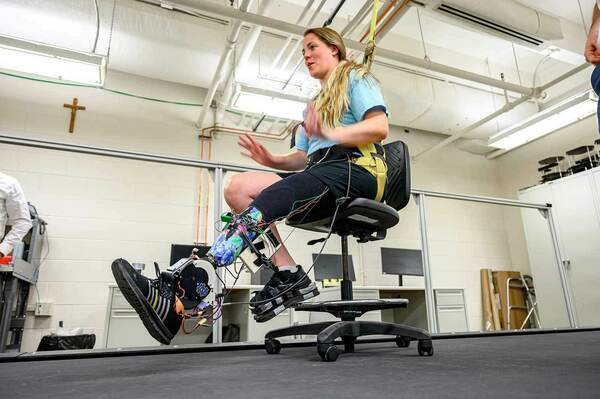National Disability Independence Day was recognized July 26 in the United States. The observance commemorates the signing of the Americans with Disabilities Act into law in 1990. In this feature, we look back at a story previously published by Notre Dame Stories about how the Robotics, Optimization and Assistive Mobility (ROAM) lab in Notre Dame’s College of Engineering is enriching the lives of amputees.
 Laura Light helps test out and give feedback on the powered prosthesis developed by the Notre Dame College of Engineering’s Robotics Optimization and Assistive Mobility Lab (ROAM).
Laura Light helps test out and give feedback on the powered prosthesis developed by the Notre Dame College of Engineering’s Robotics Optimization and Assistive Mobility Lab (ROAM).Grasping the railing of a stopped treadmill in the basement of Fitzpatrick Hall of Engineering, Laura Light broke into an electric smile as she used an experimental foot-and-ankle prosthesis to stand on her tiptoes.
Patrick Wensing, an assistant professor of aerospace and mechanical engineering who specializes in robots and motorized prosthetics, gave a thumbs-up to his two doctoral degree students. David Kelly focused on Light’s balance and safety, while Ryan Posh watched the data his computer received from several electric sensors attached to the muscles of Light’s residual left calf.
The sensors read electrical twitch signals from Light’s muscles, allowing her to fully control for the first time the forward roll of a motorized ankle device — and to ultimately stand on her toes.
“I feel like a little kid,” said Light, 28. “That was amazing, because I have not been able to do that ever — since my foot was amputated as a little child. That was a really cool experience, something I always wanted to do as a kid.”
Originally published by the Office of Strategic Content at nd.edu/stories on June 27, 2022.